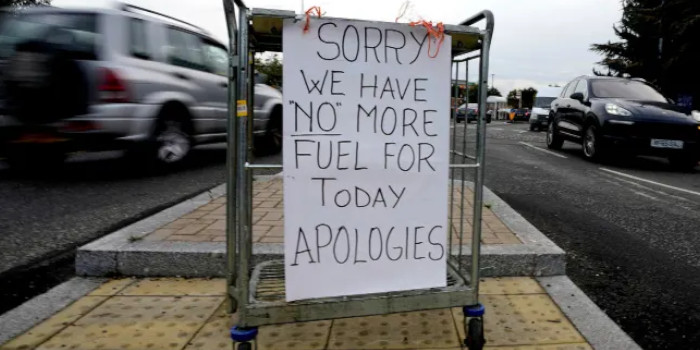On 23 September, energy company British Petroleum announced that tens of forecourts in its 1,200-strong network were experiencing fuel shortages, as well as Tesco and Esso that reported, some of their sites were also affected. The Petrol Retailers Association (PRA) reported on Monday that as many as two-thirds of its nearly 5,500 independent outlets were now out of fuel. Others were “partly dry and running out soon”. The same stance was echoed by UK government ministers and oil companies, such as Shell, ExxonMobil and Greenergy.

The huge mess caused by the lack of petroleum in stations provoked people to act in hurry and created a panic in society. One of the petrol mess’ side-effects was a case with a driver who pulled a knife on another one. The video shows a man with a knife arguing with a driver and repeatedly kicking his car. Moments later the car collides with the man and throws him onto the car’s bonnet. This doesn’t stop him and even after he continues his attacks.
“Police were called at 14:37 on Monday, 27 September to report an altercation between two motorists outside a petrol garage at Bellegrove Road in Welling. Officers rushed in and found no trace of any vehicle. No one was reported injured and no suspects were identified,” Metropolitan Police spokesperson said as quoted by the Granthshala News.
To solve the problem of petrol shortage, the British army could soon deploy its own fuel tankers with the aim of filling a major logistics gap. This is according to the UK Defence Secretary Ben Wallace on Monday night, with the government stating that army tanker drivers would receive specialized training to “enable them to seamlessly work with industry to address the supply chain pressures”, RT reports.
“The men and women of our armed forces stand ready to alleviate the transport pressures where they are felt most. That is why I have authorised their increased preparedness so they are ready to respond if needed,” he said.
Cabinet ministers had assembled on Monday to consider measures to remedy the situation amid calls to provide ambulance drivers, healthcare staff and other essential workers priority access to fuel. Business Secretary Kwasi Kwarteng emphasized it was right for the UK government to take “sensible, precautionary steps”.
“The UK continues to have strong supplies of fuel. However, we are aware of supply chain issues at fuel station forecourts and are taking steps to ease these as a matter of priority. If required, the deployment of military personnel will provide the supply chain with additional capacity as a temporary measure to help ease pressures caused by spikes in localised demand for fuel,” said he.
The German Chancellor candidate to take over from outgoing Angela Merkel, Olaf Scholz, has blamed post-Brexit fallout, such as the decision to end freedom of movement with Europe, for Britain’s current petrol crisis.
“The free movement of labour is part of the European Union, and we worked very hard to convince the British not to leave the union,” said the politician.
He also suggested the British government might need to consider levels of pay and conditions of employment in the trucking industry.
“It might have something to do with the question of wages… If you understand that being a trucker is really something which many people like to be and you don’t find enough, this has something to do with working conditions and this is something that has to be thought about,” said Scholz.
As stated in Sputnik, dismissing the claims that Brexit was to blame for the crisis, UK Transport Secretary Grant Shapps said Europe’s driver shortage was no more evident than Britain’s.
The leader of the Federation of Dutch Trade Unions (FNV) Edwin Atema said Europe’s drivers don’t want to return to the UK to help the country get out of the situation.
“The EU workers we speak to will not go to the UK for a short-term visa to help the UK get out of the s*** they created for themselves. It’s not like offering a visa… and the issue will be solved. Drivers need way more than a visa and a pay slip,” Atema said.
Atema adds that drivers from across Europe have lost trust in the industry.
“Long before coronavirus and Brexit this industry was sick already, plagued by exploitation… which ended up with drivers voting with their feet and leaving,” he admits.
In support of the drivers spoke out a British Conservative MP for Wokingham John Redwood.
Forsided, 28.09.2021
Source: Sputnik
